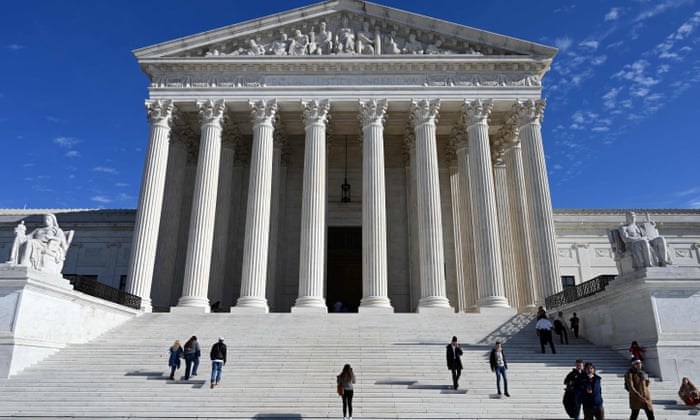
US supreme court will hear challenge to affirmative action in college admission
Harvard and University of North Carolina are defendants, giving majority-conservative court an opportunity to overturn precedent.
Historically, the supreme court has upheld the use of race-based considerations in college admissions since first affirmative action case in 1974.
The US supreme court agreed on Monday to hear a pair of cases on race-based affirmative action in college admission, giving the majority-conservative court an opportunity to overturn protections that increase opportunities for individuals belonging to groups known to have been discriminated against.

It is the latest high-profile issue to be taken up by the court, which is also set to examine major cases on abortion, gun control, religious freedoms and Covid-19.
Both affirmative action cases have been brought by Students for Fair Admissions (SFFA), a non-profit led by the conservative activist Edward Blum, who has spent much of the last decade trying to end affirmative action in higher education.
Harvard, a private institution, and the University of North Carolina, a state school, are the defendants for the two court cases.
“Any ruling that calls into question the legality of race-conscious admissions would be a reversal of more than 40 years of Scotus decisions that have repeatedly and consistently confirmed the constitutionality and legality of race-conscious admissions in higher education,” Legal Defense Fund, a prominent civil rights law organization that fights for racial justice, said in a statement.
Blum was behind Fisher v University of Texas, the last case on affirmative action that the supreme court considered in 2016. In that case, Blum argued that the university’s admission policies discriminated against Abigail Fisher, a white applicant. In a 4-3 ruling, the court upheld affirmative action, with then justice Anthony Kennedy being the only conservative judge who ruled in favor of the policy.
However, the makeup of the court has changed dramatically since then, with three conservative justices appointed during Donald Trump’s presidency. Chief Justice John Roberts, who has in recent decisions voted alongside the court’s liberal minority faction, has also spoken out against affirmative action in the past.
The cases will be the first opportunity the Trump appointees will have to review affirmative action. Historically, the court has upheld the use of race-based considerations in college admissions since the first affirmative action case in 1974, often citing the benefits of having a diverse student body.
Jen Psaki, White House press secretary, declined to comment on the litigation, but said the Biden administration “strongly believe[s]” in the “benefits of diversity in higher education”.
Lawyers from Harvard and the University of North Carolina, along with the US justice department, urged the court not to take on the case, saying that the schools’ policies were in line with affirmative action protections upheld by previous supreme court cases.
Two lower courts upheld Harvard’s use of affirmative action, with one federal court judge saying that Harvard’s use of race was meaningful, but not “impermissibly extensive”.
“Harvard’s race-conscious admission program ensures that Harvard can retain the benefits of diversity it has already achieved,” said US circuit judge Sandra Lynch in the US appeals court ruling.
In a statement, Harvard’s president, Lawrence Bakow, said that the court’s decision to review the case “puts at risk 40 years of legal precedent” that allowed institutions to “create diverse campus communities”. UNC said in a statement that their admissions process was “consistent with longstanding supreme court precedent and allows for an evaluation of each students in a deliberate and thoughtful way”.
SFFA alleges that race-based admission – which has boosted the admission rate of applicants from historically marginalized backgrounds, particularly Black and Hispanic students – has led to discrimination against Asian Americans.
“It is our hope that the justices will end the use of race as an admissions factor at Harvard, UNC and all colleges and universities,” Blume said in a statement. “The cornerstone of our nation’s civil rights laws is the principle that an individual’s race should not be used to help or harm them in their life’s endeavors.”
The court will probably hear arguments for the case in its fall session, with a possible ruling in summer 2023.
By Lauren Aratani
Courtesy of theguardian.com
~~
Editorial Note:
The World Socialist Web Site (WSWS) has published a series of articles exposing the reactionary nature of the policy of Affirmative Action. Few articles are listed below:
“A lot of things come down to money”: Race-based affirmative action and the furor over Canadian academic Carrie Bourassa’s native identity claims By Lee Parson 10 December 2021
Science professor’s MIT lecture cancelled over views on affirmative action, By Kevin Reed 22 October 2021
The Harvard case on racial preferences and the antidemocratic character of affirmative action By Ed Hightower 19 October 2018
New York Times surveys the results of 35 years of affirmative action By Fred Mazelis 13 September 2017
Affirmative action and the right to education: a socialist response Joseph Kay, Patrick Martin 3 May 2001

